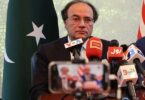Notwithstanding that Pakistan has technically got a three months reprieve but it may be placed on the grey-list of money laundering and terror financing in June if the incumbent government as usual demonstrates a non-serious and defiant attitude to the international community to eradicate these issues of global concern. During the Financial Action Task Force (FATF) plenary session, the tweets of Foreign Minister Khwaha Asif, Interior Minister Ahsan Iqbal and Miftah Ismael, Advisor to the prime Minister added fuel to the fire. The disinformation and obduracy campaign carried out with irresponsible tweeter messages infuriated the sponsor and cosponsor of resolution seeking Pakistan’s placement on the watch-list and compelled its friends to unwillingly abandon their support at FATF meeting. The result was that Pakistanis staunch allies China and Saudi Arabia withdrew its support when the United States pressed for punitive action against Islamabad.
The situation warrants a detailed review of the foreign and interior policies because in this case the total confusion in the interior policy has greatly damaged Pakistan’s soft image abroad. The way both federal and provincial governments hindered the implementation of National Action Plan in totality is a classic example. Even after the diplomatic fiasco at FATF, the PML-N government is not inclined to take corrective measures in the domain of interior policy and address the weaknesses in foreign policy. There are indications that they will leave the baggage of international community concerns about the ineffective antimony laundering and terror financing preventing laws to the incoming caretaker government. It seems that the PML-N government like the previous PPP government lacks the spine and determination to fight the twin menace of money laundering and terror financing headlong.
Pakistan needs to revisit its foreign policy-a neglected area-to win back balanced relationship with world. Out of its four neighbors it has friendly working relationship only with China. Afghanistan and India are critical of Pakistan’s foreign policy, while with Iran bilateral relations requires improvement. Even China sometimes express concern when the militants of Eastern Turkistan Islamic Movement sneak into Pakistan. A letter was sent on 21st October last year to the interior ministry about the entry of a terrorist of this group into Pakistan and his name also mentioned in the letter.
Pakistan would find it tougher to smoothly run it’s financial and trade ties with many countries, which it successfully managed during 2012-15 when it was put on the watch-list for the first time. Previously the country remained on the grey list but found no difficulty in acquiring $ 6.6 billion loans from the International Monetary Fund (IMF). This time Pakistan would find a different world. The likely impact would be a downward revision in credit rating by global financial institutions. One of the top three credit rating agencies, Fetch had changed Pakistan’s economic out look from stable to negative in January, a month before the FATF reprieve till June. The World Bank in its Report “South Asia Focus Fall”, released in August last year, passionately urged the government to correct the fiscal imbalances including the widening current account deficit, reckless borrowings and narrow tax base. The sane advice of this international donor agency was not accepted and the Interior Minister Ahsan Iqbal slapped a sarcastic and despicable repudiation in its face.
Foreign direct investment may also take a hit due to likely increase in risk factor. The stock market may face a dip in foreign portfolio investment. Opening of letter of credit for imports may become expensive. In a nutshell Pakistan’s cost of doing business, which is already on high side, may further increase. The foreign exchange reserves have dropped to $ 12 billion despite the recent Chinese loan of $500 million. The country would face an import payment crisis in June as foreign exchange reserves are fast depleting due to widening current account deficit. Hence, there will be a dire need of $2. 5 billion loans through Euro bonds. In the meanwhile, the government will have to come from the state of denial and take immediate measures to remove the concerns of international community. The national narrative ‘Paigham-e-Pakistan’ which is hitherto a mere piece of paper must be implemented on urgent basis. Cosmetic mechanism and hollow rhetoric will not convince world.






